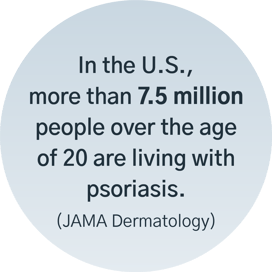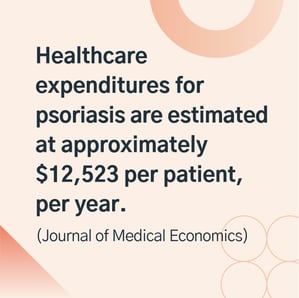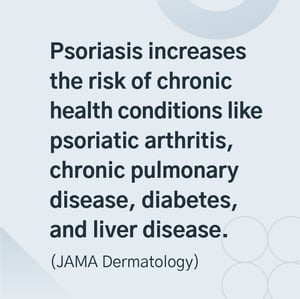
Can behavioral healthcare help the millions worldwide who suffer from psoriasis?
Without a cure, managing the painful symptoms of this disease is the primary objective for caregivers and patients. Clinical evidence suggests that behavioral health and psychological interventions can not only generate statistically significant improvements in wellbeing and anxiety, but they may also reduce the amount of time people spend in the hospital following serious outbreaks.
A "SERIOUS GLOBAL PROBLEM"
Psoriasis is an immune-mediated condition [1] that causes inflammation and more rapid generation of skin cells, leading to plaques and scales on the skin, which can sometimes be painful or itch [2].
 Worldwide, the prevalence of psoriasis ranges from 0.09% to 11.43%, leading the World Health Organization to recognize it as a “serious global problem” [3]. In the United States alone, over 7.5 million people over the age of 20 are living with psoriasis [4].
Worldwide, the prevalence of psoriasis ranges from 0.09% to 11.43%, leading the World Health Organization to recognize it as a “serious global problem” [3]. In the United States alone, over 7.5 million people over the age of 20 are living with psoriasis [4].
THE HIGH COST OF PSORIASIS AND COMORBIDITIES
Given the physical, psychological, and social ramifications of psoriasis, there is a tremendous economic burden associated with this particular chronic condition. In the U.S., total costs associated with psoriasis are around $112 billion annually [5], and all cost healthcare expenditures are estimated at approximately $12,523 per patient, per year [6].

The largest proportion of these costs stem from outpatient treatment followed by prescription costs [7]. These costs per patient increase over time as the disease progresses, and are substantially higher among people with moderate to severe psoriasis, who represent 21-33% of people diagnosed with psoriasis [6].
Itching, pain, or scaling (i.e., patches on the skin from psoriasis) associated with psoriasis also interfere with work, leading to missed workdays and lower productivity [8]. In one study, nearly 70% of people with psoriasis reported at least one work absence during the year that was not considered recreational/vacation, and they were at least 1.4x more likely to have a non-recreational work absence compared to healthy controls. Fifty-six percent also reported taking sick leave and were at least 1.4x more likely to do so compared to healthy controls.
This amounts to an estimated cost to employers of $1657 per patient, per year due to missed work days alone [9]. The negative impact of psoriasis in the workplace is even greater among those with moderate to severe psoriasis. In a survey of adults with moderate to severe psoriasis, 37% of respondents indicated losing between 3 and 10 work days during the previous three months due to psoriasis treatment [10].
Part of what makes psoriasis such a costly disease is that it also increases the risk of developing several other chronic health conditions including psoriatic arthritis, chronic pulmonary disease, diabetes, liver disease, peptic ulcer disease, peripheral vascular disease, renal disease, rheumatologic disease, and heart attack [11].
These comorbidities account for approximately $36.4 billion of the costs associated with psoriasis [5].

Compared to people without psoriasis, healthcare costs are 50% higher among psoriasis patients without any comorbidities, 168% higher among psoriasis patients with 1-2 comorbidities, and 494% higher among psoriasis patients with 3 or more comorbidities. Similarly, indirect work-loss related costs are 52% higher among psoriasis patients with no comorbidities, 105% higher among those with 1-2 comorbidities, and 267% higher among those with 3 or more comorbidities [7].
The Psychological Toll of Psoriasis
While psoriasis is associated with a higher risk for various physical conditions, the visible nature of scaling and perceived stigma related to psoriasis also tends to elicit distress among psoriasis patients including embarrassment, shame, low self-esteem, and self-consciousness [12]. These high levels of distress negatively impact mental health, particularly when psoriasis patches are visible [13]. Studies suggest that 10% of psoriasis patients experience clinical levels of depression, and nearly twice that number report depressive symptoms more broadly; these levels are significantly higher than what is reported by healthy controls [14]. The relationship between psoriasis and depression may not just be a result of self-consciousness; some researchers argue that psoriasis patients are also predisposed to depression because of the inflammatory response caused by psoriasis [15].
Consistent with these statistics, a recent survey of 246 American adults with psoriasis or psoriatic arthritis conducted by our Twill Care for Psoriasis team found that 43.31% of survey respondents said “very much” or “extremely” when asked how much their psoriasis or psoriatic arthritis impacted their mental health. What’s more, 35.43% of these survey respondents reported significant depressive symptoms, 40.1% reported significant anxiety symptoms, and 26.7% reported significant symptoms of both.1 The majority of survey respondents (64.89%) also said their mental health difficulties interfered with their personal relationships and social activities.
As one Twill Care for Psoriasis member described it, they didn’t “want to interact with people or sometimes even get out of bed because it seems like a mountain is in front of you without any of the right equipment.”
Not surprisingly, these concerns have been compounded by the COVID-19 pandemic. In another survey of 117 Twill Care for Psoriasis members, our research team found that 53% reported feeling more depression, 63% reported feeling more anxiety, and 74% reported feeling more stress during the pandemic. Furthermore, 54.3% reported experiencing more psoriasis symptoms than usual, and 42.31% reported their psoriasis had more of an impact than usual on their mental health during the pandemic.
Coping with the Impact of Psoriasis on Mental Health
Given the high levels of distress among psoriasis patients, and that psychological stress may act as a trigger for skin flares among some psoriasis patients [16], researchers have argued that an important component of a psoriasis management plan should include addressing mental health [17]. Indeed, there’s some evidence to suggest that mindfulness-based cognitive therapy [18] and cognitive behavioral therapy (CBT) [19] may be effective for psoriasis patients, and some preliminary research has even shown that psychological interventions may have benefits for psoriasis outcomes as well. For example, one study found that psoriasis patients who participated in a psychological intervention targeting stress and anxiety had shorter hospitalizations [20].
In our own research, we’ve shown that people with chronic health conditions have lower levels of wellbeing to begin with, but improve at the same rate as healthy controls while using Twill[21]. More recently, we analyzed data from 219 Twill users with self-reported psoriasis.2 We found that when these users completed at least 16 activities on Twill Care, as recommended, they experienced statistically significant improvements in both wellbeing and anxiety compared to users who completed less than the recommended 16 activities.3 More specifically, users who completed at least 16 activities improved their happiness scores by 26.8% and improved their anxiety scores by 26.64% between their first and last in-app assessments.
These data suggest that digital mental health interventions, even those that are not directly targeting psoriasis patients, may be an effective tool to help people with psoriasis cope with their mental health. Given the negative impact of the COVID-19 pandemic on mental health in general, which may be exacerbated among psoriasis patients who are experiencing worsening symptoms, accessible, digital solutions are more important than ever. Solutions like Twill may be a useful adjunct to more traditional psoriasis care plans.
Learn more about our Twill Care communities here.
Footnotes
References
About the Author
Eliane Boucher, PhD, Senior Director of Research Strategy has a PhD in Social/Personality Psychology and spent more than a decade in academic research before joining Twill. She helps to oversee Twill's program of research, including analyzing platform data, prospective studies on the impact of Twill products in various populations, patient-centered research, and other foundational research.
Read more articles by Eliane Boucher, PhD, Senior Director of Research Strategy.

